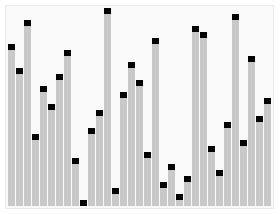常用排序算法总结7一一堆排序
在了解堆排序之前,我们有必要清楚“什么是堆呢?”。
堆(英文:heap)是计算机科学中一类特殊的数据结构的统称。堆通常是一个可以被看做一棵树的数组对象。在队列中,调度程序反复提取队列中第一个作业并运行,因为实际情况中某些时间较短的任务将等待很长时间才能结束,或者某些不短小,但具有重要性的作业,同样应当具有优先权。堆即为解决此类问题设计的一种数据结构。
堆的逻辑定义:
堆的实现通过构造二叉堆(英语:binary heap),实为二叉树的一种;由于其应用的普遍性,当不加限定时,均指该数据结构的这种实现。这种数据结构具有以下性质。
- 任意节点小于(或大于)它的所有后裔,最小元(或最大元)在堆的根上(堆序性)。
- 堆总是一棵完全树。即除了最底层,其他层的节点都被元素填满,且最底层尽可能地从左到右填入。
将根节点最大的堆叫做最大堆或大根堆,根节点最小的堆叫做最小堆或小根堆。常见的堆有二叉堆、斐波那契堆等。
定义
堆排序(英语:Heap Sort)是指利用堆这种数据结构所设计的一种排序算法。堆积是一个近似完全二叉树的结构,并同时满足堆积的性质:即子结点的键值或索引总是小于(或者大于)它的父节点。

算法步骤
堆排序的根本是进行一次堆的构建过程。
- 得到当前序列的最小(大)的元素
- 把这个元素和最后一个元素进行交换,这样当前的最小(大)的元素就放在了序列的最后,而原先的最后一个元素放到了序列的最前面
- 这交换可能会破坏堆序列的性质(注意此时的序列是除去已经放在最后面的元素),因此需要对序列进行调整,使之满足于上面堆的性质
- 重复上面的过程,直到序列调整完毕为止
堆的操作
在堆的数据结构中,堆中的最大值总是位于根节点。堆中定义以下几种操作:
- 最大堆调整(Max_Heapify):将堆的末端子节点作调整,使得子节点永远小于父节点
- 创建最大堆(Build_Max_Heap):将堆所有数据重新排序
- 堆排序(HeapSort):移除位在第一个数据的根节点,并做最大堆调整的递归运算
堆节点的访问
通常堆是通过一维数组来实现的。在数组起始位置为0的情形中:
- 父节点i的左子节点在位置(2*i+1);
- 父节点i的右子节点在位置(2*i+2);
- 子节点i的父节点在位置floor((i-1)/2);
代码实现(java)
1 | /** |